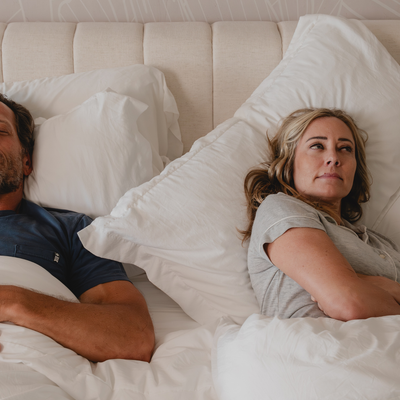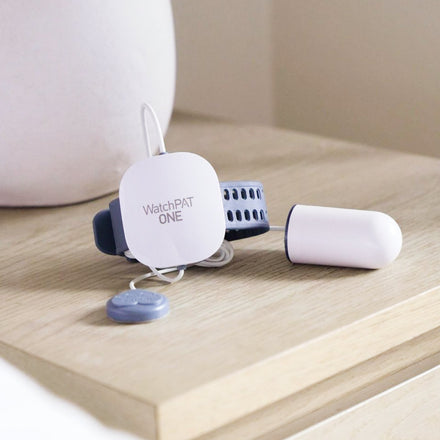When it comes to sleep and your health, the chicken-or-egg scenario plays out for so many questions. Do sleep challenges affect my health, or do health challenges affect my sleep? Does sleep apnea cause weight gain, or does weight gain cause sleep apnea?
The order of factors (chicken vs. egg, sleep vs. weight) matters less than the facts: sleep and weight are connected, which means sleep apnea and weight gain are also linked.
Before we go into details, it’s important to remember that anyone can develop sleep apnea, regardless of body type. This article is intended to explore the connection and impact of weight and sleep apnea on your general health and wellness.
Does Sleep Apnea Cause Weight Gain?
Several studies have found that increased body weight is associated with a higher risk of developing sleep apnea, also called obstructive sleep apnea (OSA). This association goes both ways: if you are considered overweight or obese, you are more likely to develop sleep apnea. And if you have sleep apnea, you are at higher risk for weight gain or obesity.
Let’s say you are overweight or obese, and you are diagnosed with OSA. Since weight loss is a proven method to eliminate mild or moderate cases of sleep apnea, your first step toward improving sleep will likely be to reduce your weight.
So, you decide on a diet and exercise routine and begin your weight-loss journey. But along the way, you run into aggravating roadblocks caused by OSA, like headaches, excessive daytime sleepiness, and an inability to focus.
Managing sleep apnea and weight loss feels nearly impossible. How can you stick to your new diet and exercise routine if you also have to cope with the energy-sapping symptoms of OSA?
The answer is not a matter of willpower; it’s a matter of sleep. If you’ve struggled to lose weight and keep it off long-term, the culprit could be poor sleep due to sleep apnea.
How Poor Sleep Affects Your Weight
Sleep profoundly impacts your overall health because it recharges your brain and body. When you experience disrupted or low-quality sleep, you don’t get the rest you need to restore your energy levels. And when your energy drops, you also lose the motivation, clarity, and focus to keep up your weight-loss routine.
You’re too tired to work out. You’re too distracted to notice what you eat. Untreated OSA leaves you too mentally, emotionally, and physically fatigued to effectively maintain your weight-cutting routine — which makes you more likely to keep on (and possibly gain more) weight.
Can Losing Weight Cure Sleep Apnea?
For those who experience weight-related OSA, losing weight is one of the only known cures. Since a weight-loss routine is far more effective when you get restful sleep, CPAP therapy provides the treatment you need to manage your sleep apnea and improve your sleep.
OSA occurs when your upper airway gets partially or completely blocked while you sleep. As a result, your breathing gets disrupted repeatedly, causing you to wake up multiple times — from five to more than 30 times per hour! — during the night.
CPAP therapy counteracts OSA by using a nasal, facial, or oral device to deliver a constant flow of air pressure to your lungs. As a result, CPAP treatment relieves the symptoms of sleep apnea so that you get restorative sleep that is not disrupted by irregular breathing and constant wake-ups.
Can I Have Sleep Apnea if I am Not Overweight?
Yes! Weight is an indicator of sleep apnea risk, but you can have sleep apnea for reasons that aren’t connected to your weight.
Does Obesity Cause Sleep Apnea?
Obesity isn’t the singular cause for sleep apnea, but there is a strong link between the two conditions. People with excess weight may have extra tissue or fat deposits in their throat or upper respiratory muscles, which can narrow or block the flow of air into their lungs.
Therefore, an indicator of sleep apnea risk is Body Mass Index (BMI), particularly for people who carry extra weight around their neck. (People with thicker necks may have narrower airways.)
Conversely, people with sleep apnea are more at risk for obesity because interrupted sleep can lead to sleep deprivation, daytime sleepiness, and a disrupted metabolism. An additional concern for people with sleep apnea is the effect of weight on the severity of their sleep apnea.
Results from a Sleep Heart Health Study showed that even relatively small increases in body weight were associated with more severe sleep apnea. So, no matter which factor you consider first — obesity or sleep apnea — there is a correlation between the two medical conditions.
The Sleep and Weight-Gain Connection
At this point, it’s clear that obstructive sleep apnea and weight gain are linked. Eating behaviors, physical activity, and cutting down on smoking and drinking are lifestyle modifications that impact the success of your weight-loss or weight-management plan. And so does sleep.
If you struggle with sleep apnea and weight gain, consider CPAP therapy. Regular, consistent use of a CPAP machine will help you get the restorative sleep you need to stick to your weight-loss routine.
Not sure if you have sleep apnea? You can get diagnosed by taking a home sleep test from Lofta. If you are diagnosed with sleep apnea, a Lofta Sleep Champion will walk you through the steps to find the right CPAP device for your sleep needs. For better sleep, for health — try a home sleep test today!













































